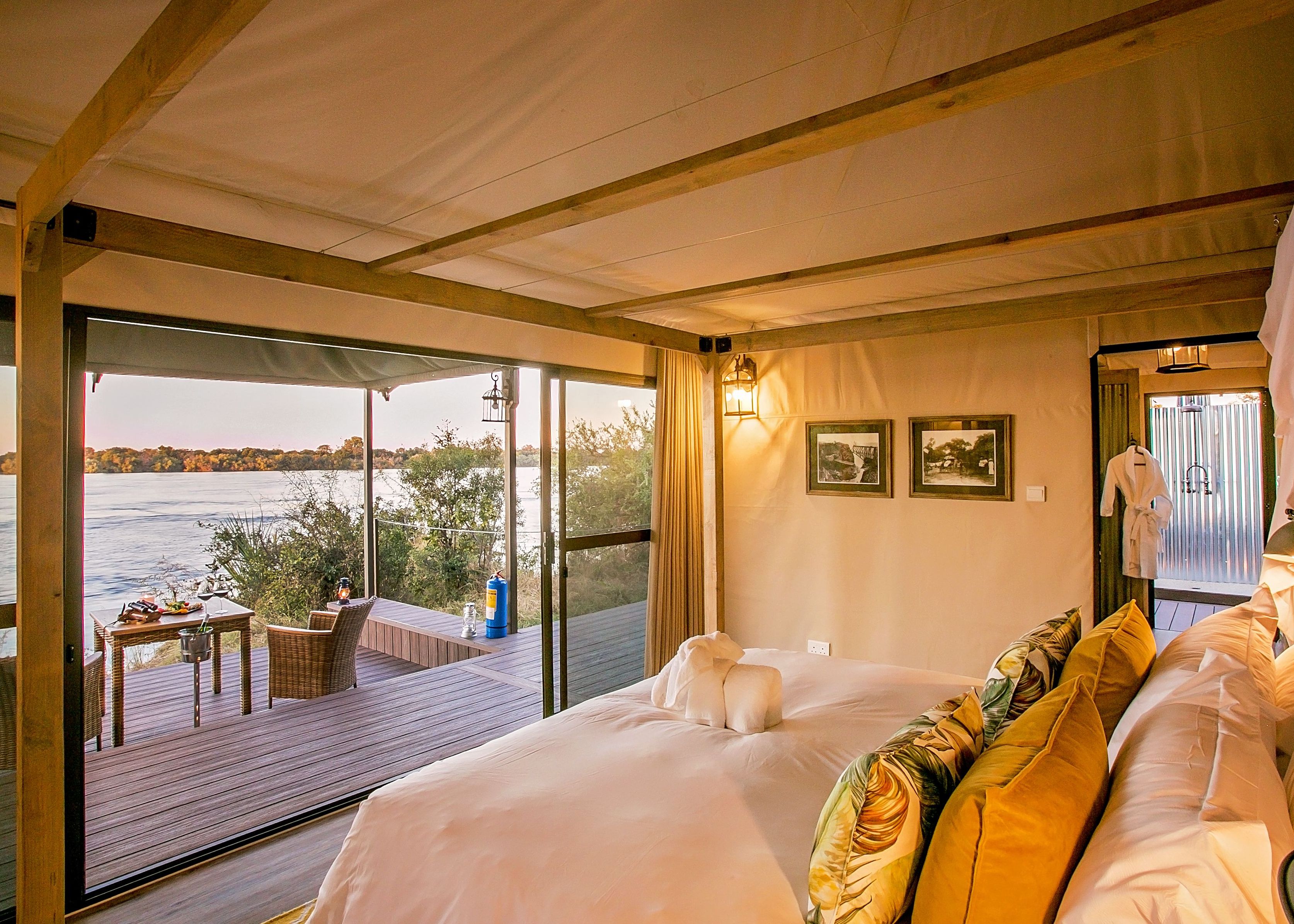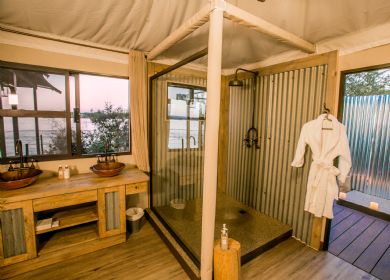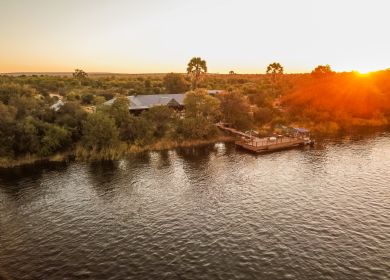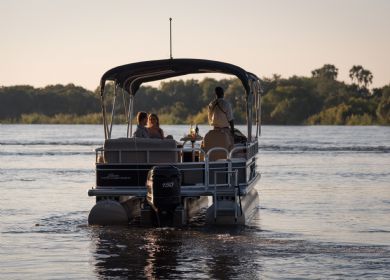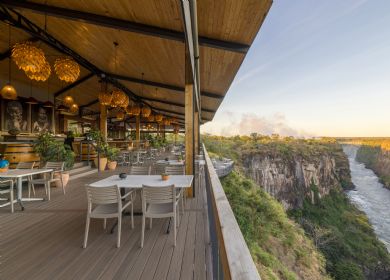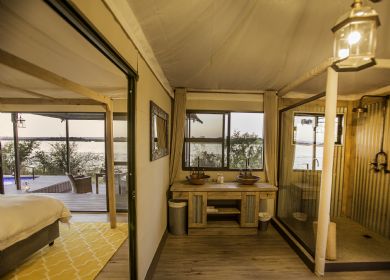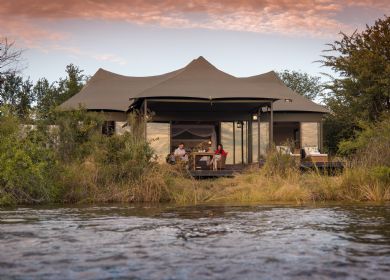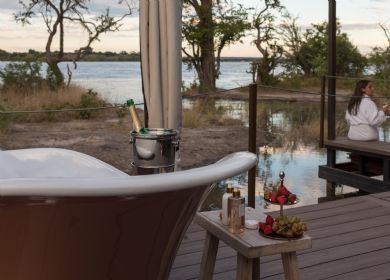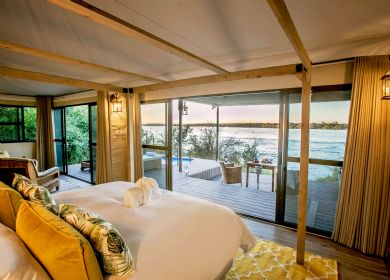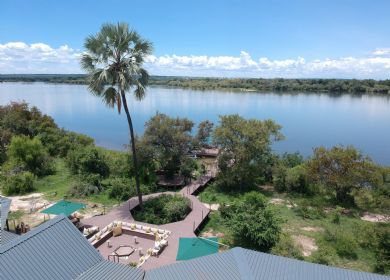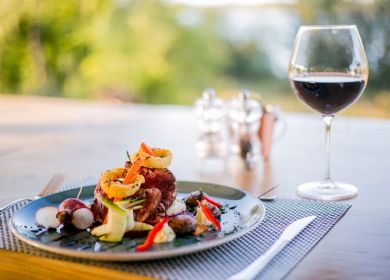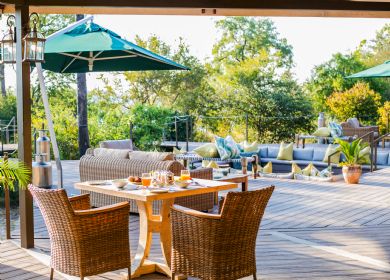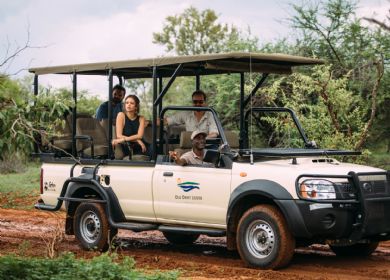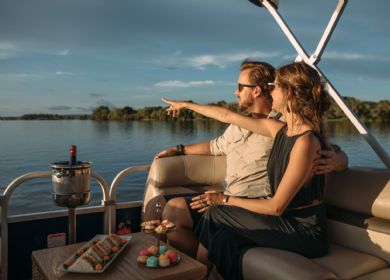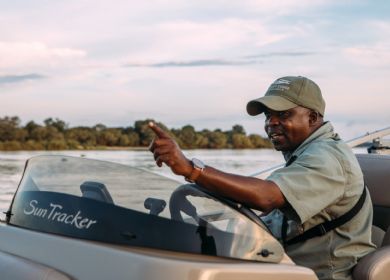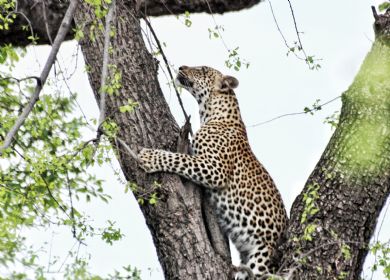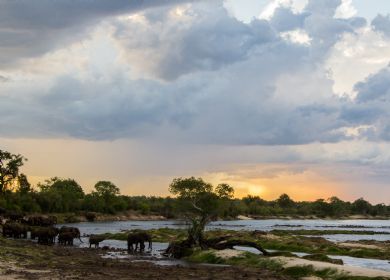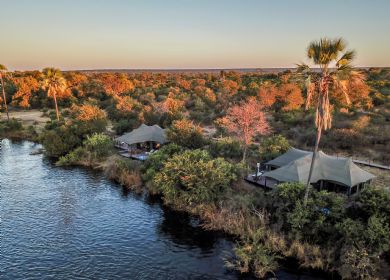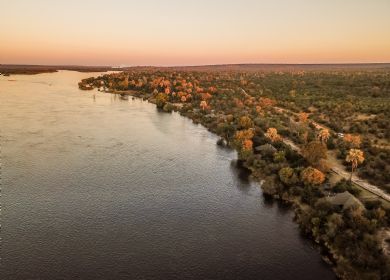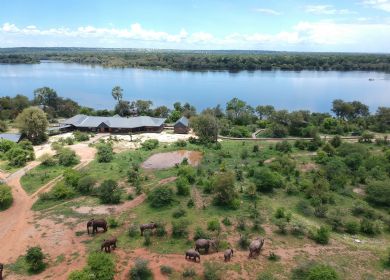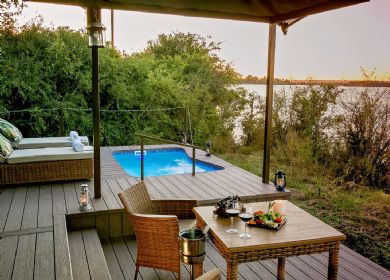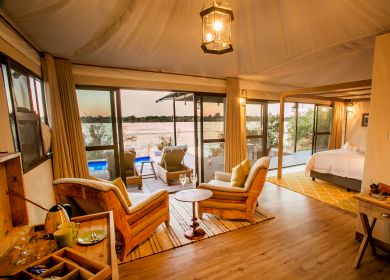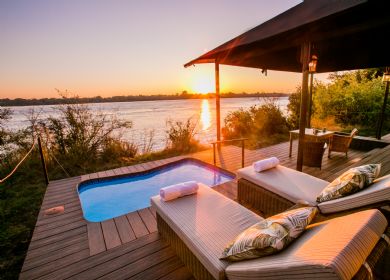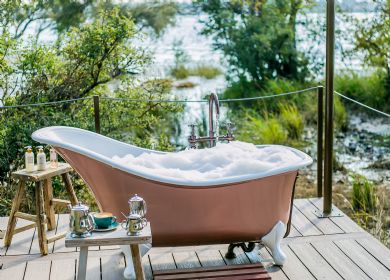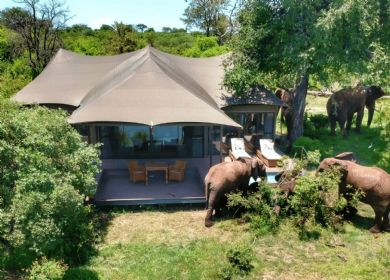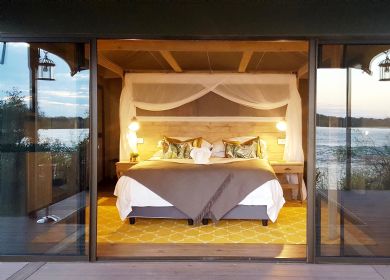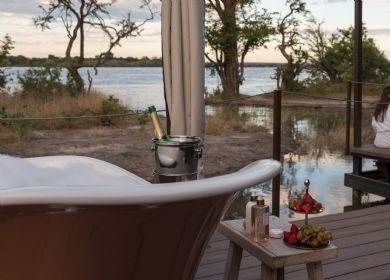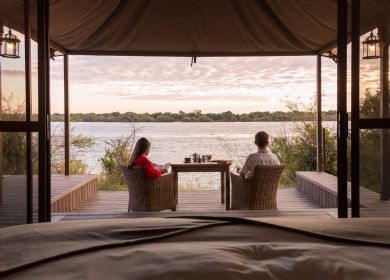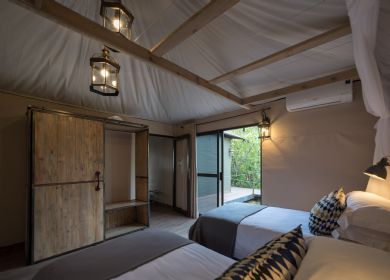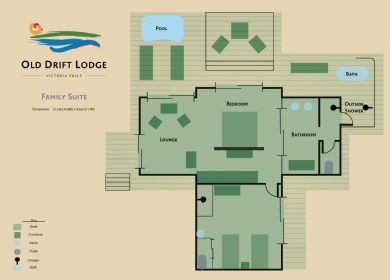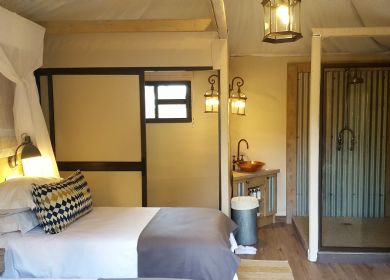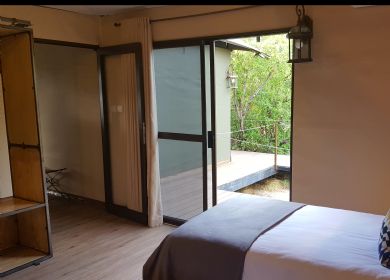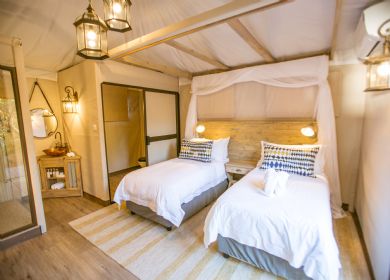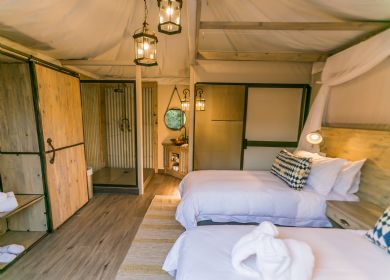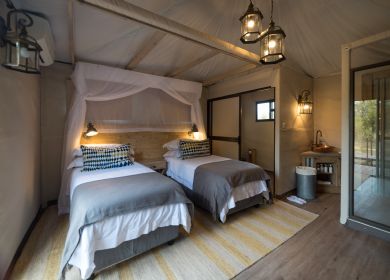
Children over the age of 7 are most welcome at Old Drift Lodge.
Children aged 7 – 16 years (inclusive) will be accommodated at 50% of the adult sharing rate.
Family Suites can accommodate up to 4 guests.
Children under the age of 16 years are not permitted on any Walking Safaris.
Nature has given Zimbabwe one of the finest climates in the world, which is warm without being oppressive and with a daily average sunshine of approximately ten hours all year round. Generally, the days are bright and sunny, the nights clear and cool. November to April is summer (rainy season)while winter is from May to July, with generally dry weather. The period August to October is very hot and dry. In the latter summer temperatures can soar to over 35C compared with the Highveld’s average 25o C to 35oC. Daytime winter temperatures average 13oC to 20oC but can fall to –5oC at night.
Zimbabwe is a great year-round destination, however the best time of the year to visit will depend on what you are most interested in seeing and doing.
In April the Victoria Falls are at the most spectacular with beautiful balmy weather taking place and the amazing spectacle of the Zambezi in full flood, rushing into the gorge below. The multitude of viewing points on the Zimbabwe side makes it the best place to view the falls from.
During the winter months, the game viewing around waterholes is outstanding.
From August onwards, the months of summer provide the perfect opportunity to experience the white water rafting, river boarding and canoe trips up the Zambezi River.
Furthermore, the bird life during this time is at its most spectacular, which a huge variety of migrant birds returning south to spend the summer months in and around the Zambezi River. Photography will also be excellent during this time of the year as much of the surrounding wilderness will be in full bloom as a result of the summer rains. Blooming flowers, moody sunsets and epic thunderstorms all provide easy pickings for any photographer’s portfolio of African images.
• Zimbabweans are very warm, friendly people and will typically greet you enthusiastically.
• Handshake greetings are very common in Zimbabwe, which typically comprise of three stages: a normal handshake, which is followed by a connection of hooked fingers (thumbs raised and touching) and finishing in a normal handshake – ask a local to show you how!
• Speaking to someone with your hands in your pockets is considered very rude.
• When you wave hello, be sure to rotate your wrist. A simple palm-outward raised hand is a sign of opposition to the president and government. It’s an easy mistake to make that could be misinterpreted as offensive!
• Tips of 10% are customary
There are two main seasons, the rainy season (November to April) corresponding to summer, and the dry season (May/June to October/November), corresponding to winter. The dry season is subdivided into the cool dry season (May/June to August), and the hot dry season (September to October/November). The modifying influence of altitude gives the country pleasant subtropical weather rather than tropical conditions during the cool season of May to August.[32] However, average monthly temperatures remain above 20 °C (68 °F) over most of the country for eight or more months of the year.
Not recommended.
• Zambians are very warm, friendly people and will typically greet you enthusiastically. Handshake greetings are very common in Zambia, which typically comprise of three stages: a normal handshake, which is followed by a connection of hooked fingers (thumbs raised and touching) and finishing in a normal handshake.
• Speaking to someone with your hands in your pockets is considered very rude.
• Tips of 10% are customary.
The Zambian Kwacha is the currency of Zambia. Studies show that the most popular Zambia Kwacha exchange rate is the ZMK to USD rate. The currency code for Kwacha is ZMK, and the currency symbol is ZK.


Maximum of 2 guests per suite, 3 of which have star bed platforms attached
Maximum of 2 pilot/ guides
US$223.00 per person per night (subject to availability) Should the guides room not be available Guides/Pilots will be charged at 50% of the applicable rate where 5 or more standard rooms have been booked, otherwise they will pay the full rate for a room. Conservation Levy of US$ 20.00 per night (subject to change) is payable by the pilot / guide

Two scheduled game activities per day (River safari, Guided Walking safari & Game Drives on
offer)
Old Drift has two luxury 12 – 14 seater cruise boats which will be used for morning and afternoon river safaris. Drinks and snacks will be provided on both safaris.
Two scheduled game activities per day (River safari, Guided Walking safari & Game Drives on
offer)
Morning and afternoon game drives in 4 x 4 game viewing vehicles will take you along the Zambezi River through the Zambezi National Park. Game that can be seen include elephants, buffalo, kudu, giraffe, zebra, eland, impala, warthogs, lion, leopard, wild dog and on occasions, cheetah. Tea baskets and snacks will be taken on the morning drives and Sundowners and snacks on the afternoon game drives.
Zimbabwe (Excluding Rainforest Entry Fees - currently US$20 for SADCC Residents & US$30 for Internationals)
A guided tour of “the Victoria Falls” is included in the nightly rate, but excludes park fees which are payable direct. This can be booked in conjunction with a lunch at the Lookout Café.
On Request (Including drinks)
Guests have the option to enjoy a lunch at the Lookout Café, inclusive of drinks. This can be booked in conjunction with the Tour of the Falls or for the adrenalin lovers, after they have taken part in any of the high wire activities that take place at the “Lookout”.
Two scheduled game activities per day (River safari, Guided Walking safari & Game Drives on
offer)
Morning and afternoon walking safaris will take place along the river but also in the spring lines of Zambezi National Park. Guests will be accompanied by a Professional Guide. Please note that children under the age of 16 years are not permitted on walking safaris.

Visa and MasterCard accepted
Hairdryer in room
In-room safe
Mini bar
Plunge pools at each suite
Limited mobility required


See https://vfwt.org/ for more information.
Wild Horizons established the Victoria Falls Wildlife Trust, a non-profit entity and dedicated vehicle for promoting conservation awareness, education and the empowerment of local communities, through the sustainable use of endemic resources. The Trust is situated within the Wild Horizons Wildlife Sanctuary, adjacent to The Elephant Camp, and works in collaboration with authorities, local communities, and other stakeholders to protect the area’s indigenous fauna and flora. From humble beginnings in 2008, the Trust is now world renown for unprecedented success in research, outreach, rescue and rehabilitation.
The economic situation in Zimbabwe exacerbated instances of poaching, and the Trust was initially focused on the rescue and rehabilitation of injured and orphaned wildlife. In the last ten years, they have developed their conservation efforts to include working with local communities to focus on conserving habitats, finding scientific wildlife management solutions, and improving health through screening and prevention of transboundary animal diseases. The Trust has also expanded internationally with registered sister charities in both the USA and the UK.
MISSION STATEMENT
The Victoria Falls Wildlife Trust aims to inspire affirmative action every day, in every sphere of conservation and education.
The health of Africa’s ecosystems relies on the support of surrounding local communities, and to this end, the Trust has established a ‘Community Outreach and Training’ program. Through this project, they aim to inspire the external community to learn about and appreciate the importance of sustainability and conservation. To achieve this, they work closely with local communities to mitigate human-wildlife conflict, provide opportunities for conservation education and support a range of projects to empower self-sustainability. This includes vegetable and subsistence crop growing in the local villages, erecting fences on their boundary lines to prevent wild animals from damaging crops or posing a threat to the safety of the communities, and providing the machinery and transport required to cut thatching for homes.
We believe that education is the pillar that will uphold and support sustainable conservation, and the Trust is actively involved with the next generation of conservationists and environmental leaders. Annually, over a thousand school children are transported to the Trust, where they have the opportunity to interact with the wildlife ambassadors and learn from a team of passionate conservationists, who become their role models and mentors. By addressing the next generation of decision-makers, we hope to inspire them to care for their natural heritage and to become the guardians of these areas in the future.
The elephant herds that live in the sanctuary act as wildlife ambassadors for their species to champion a message of coexistence with their rural and urban neighbours. Wildlife ambassadors are animals that can not be successfully rehabilitated, and by sharing their rescue stories, these animals act as ambassadors for their species to increase awareness of their plight in the wild. Research shows that wildlife ambassadors provide compelling experiences needed for people to gain personal connections and relationships with nature. The elephants epitomise this fact, and the awe and respect that the children garner through this experience transforms their ideologies and ignites a sense of pride for their natural environment.
This grass-roots conservation education program challenges misconceptions of wildlife in rural areas in the Victoria Falls region. Our mission is to demonstrate respect for and understanding of wildlife through this opportunity to connect with animals in the most positive and natural way possible. The education program casts a pebble into the waters of change, and we are confident that the ripple effect will be felt by many generations to come.
The Trust Veterinary Laboratory and Clinic is a field station from which researchers, veterinarians, and graduate students can study zoonotic diseases that are transmitted across species and boundaries. Transmission of these diseases can cause epidemic crashes of keystone wildlife species, and to prevent the consequent socio-economic and public health catastrophes, they take samples from domestic and wild animals to understand and prohibit disease prevalence
The ‘Wildlife Rehabilitation Centre’ provides veterinary care to wildlife that has been injured, orphaned or abandoned due to snaring, human conflict, poisoning or vehicle-wildlife collisions. It is the goal of the Trust to release every injured animal back into the wild. One of the highlights of 2018 was the day that they successfully released Aardy the aardwolf back into his natural habitat. Aardy was temporarily paralysed after a vehicle hit him, and while the road to recovery was long, the collaborative effort between the private sector and government wildlife agencies ensured his successful rehabilitation.
The seeds for long-term environmental protection are planted in the Trust’s wildlife research projects. By investigating what may cause a species to flourish or flounder, they are in a stronger position to evaluate the factors and find sustainable solutions. Their ultimate research objective is to promote a sustainable harmonic existence between humans and the wilderness. For more information about their on-going projects and plans, please visit https://vicfallswildlifetrust.org/projects/
We believe that sustainability relies on the combined effort of our Victoria Falls community. The National Parks Game Scouts are invaluable in protecting our wilderness and wildlife. We provide support to the Katombora scouts in the form of food and fuel to assist in the National Parks anti-poaching efforts in Kazungula and the Matetsti areas of Zimbabwe.
The Victoria Falls Anti Poaching Unit has been instrumental in reducing instances of poaching, and we applaud their momentous success. Wild Horizons sponsors three officers employed by VFAPU to assist with anti-poaching activities in and around Victoria Falls.
This project provides jobs and income at a grassroots level. We source and donate raincoats to an association of vendors who hire them out to guests visiting the Victoria Falls rainforest. This provides an ongoing income to more than 30 vendors and their families.
The tourism industry is a vessel for cultural exchange, and it is important to Wild Horizons that we celebrate the ethnic and cultural diversity of all staff and communities that we work and engage with. We pioneered and continue to facilitate home-hosted meals to create a space within which our team can share their heritage and pass on cultural knowledge to people visiting the region. Nineteen staff members are involved with the initiative and are from various tribes including Shona, Ndebele, Nambya and Nyanja tribes. We provide transport, mineral water and soft drinks, and the host family prepares and shares a meal with their guests. The fee of this activity provides an additional source of income to the family, and provides insight into the contemporary life and society of others, promoting an appreciation of local cultures that enrich our guests own travel experience.
Once a month, Wild Horizons, together with other tourism entities in the area, embark on a litter sweep throughout the town, helping to keep Victoria Falls clean.
Wild Horizons is a community-oriented organisation, and our dedication to the next generation’s future extends beyond conservation into the realm of school education. To this end, we pay the school fees of 67 children at eight rural schools in the region.
In collaboration with the Hospitality Association of Zimbabwe, Wild Horizons contributes to the salaries of employees at the local Old Age Home. Once a year, we donate gas for their stove and host a meal for the people residing there.
Nestled within the Chinotimba township area, a community of people living with HIV/AIDS has cultivated a vegetable garden, and Wild Horizons supplies them with gardening implements, seeds and fertiliser to support this empowering and uplifting initiative.
In collaboration with the Victoria Falls Municipality, Wild Horizons monitors the upkeep of the CHOGM garden at the entrance to the town. We have installed the irrigation system and will continue to care for and maintain the garden.
Sport has the power to bring people together through a shared sense of community and purpose, and we believe that this alignment is incremental to fostering a relationship with local communities. Wild Horizons donated two soccer balls and soccer kit for 18 players in the Sizinda community soccer team, Cremora FC. Our support and involvement with their team have opened the door to future collaboration, be this in the realm of sport or conservation. We believe that this company is not a sole entity, but a member of the greater Victoria Falls community.
Our lodges are built and managed in the most eco-friendly way possible so that our presence in the wilderness enhances the quality of conservation in the area and minimises the negative impact. The lodges are built with environmentally friendly decking that is Forest Stewardship Council certified and consists of 60% bamboo fibres and 40% recycled plastic that would otherwise have entered landfills. The Elephant Camp was awarded Green Tourism Silver grading in 2016.
Our latest adventure is taking place on the banks of the Zambezi River, where we have built Old Drift Lodge. Our purpose has always been to conserve and celebrate Africa’s natural wilderness and wildlife by creating opportunities for people to journey into some of the world’s unique and exquisite areas such as the Zambezi National Park. Our mission is to protect these areas by enabling people to visit the Park, and by paying a conservation levy for every guest that stays with us, which contributes to the protection and maintenance of the wilderness and wildlife.



Number: +61 488 770 711
Email: rob@ynotconcepts.com
Number: +263 213 2844571 / 2842313
Email: lodges@wildhorizons.co.zw

